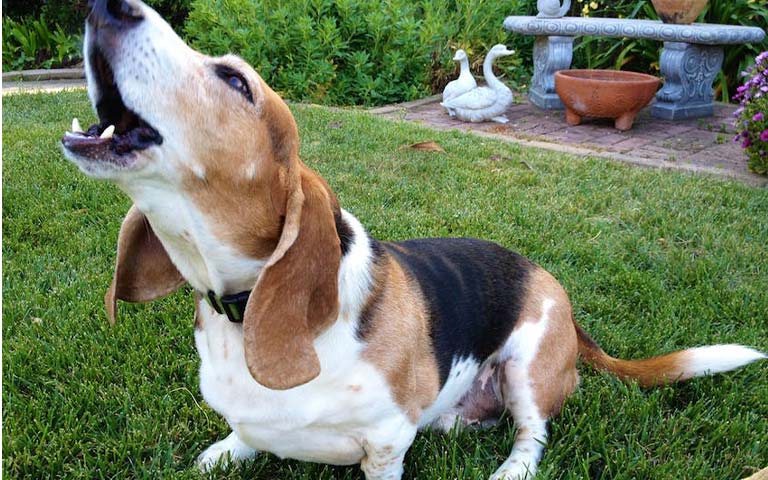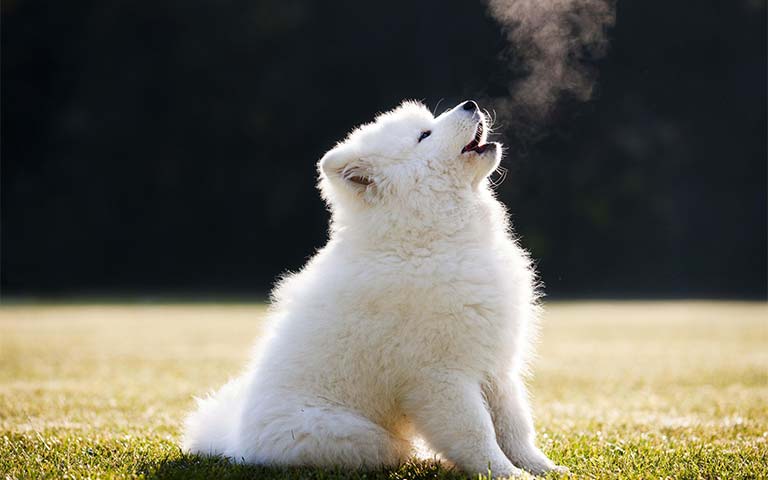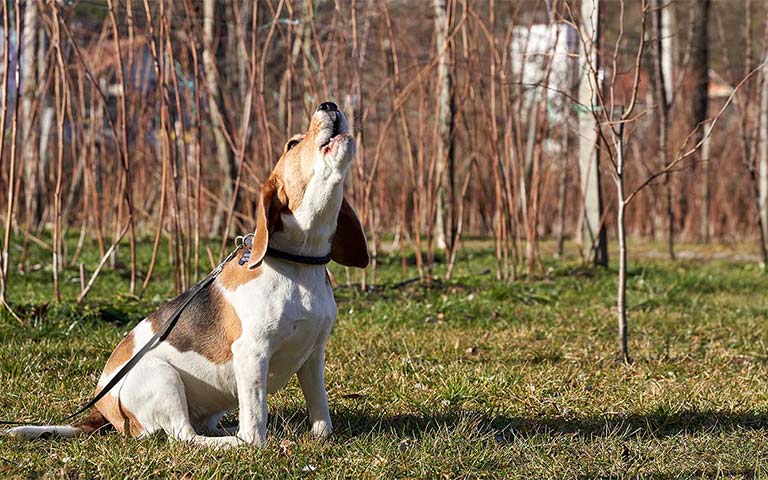Dogs are known for their loyalty, playfulness, and friendly nature, but one of their most distinctive traits is howling. You might have heard your furry friend howling at the moon, sirens, or even music, but have you ever wondered why dogs howl? In this article, we will explore the reasons behind this behavior, the meanings behind different types of howls, and whether/howling is a cause for concern.
Dogs are social animals and have evolved a variety of vocalizations, including barking, whining, growling, and howling, to communicate with their human and animal companions. Howling, in particular, has a distinctive sound that can carry for miles, making it a useful means of long-distance communication.

The Evolutionary Roots of Howling
Dogs are descended from wolves, and howling is a behavior that is still seen in their wild counterparts. In the wild, wolves howl to communicate with their pack members, mark their territory, and attract mates. Domestic dogs have retained this behavior, but with some variations.
The Different Types of Howls
There are several types of howls that dogs use to communicate different messages:
1. Lone Howls
Lone howls are usually done by dogs when they are alone or feel lonely. These howls are often prolonged and high-pitched and can be heard over a long distance.
2. Group Howls
Group howls are when dogs howl together. This type of howl is often seen in wolves and domestic dogs. Group howls are a way to communicate with other dogs and to signal the presence of their group.
3. Responding Howls
Responding howls are when a dog howls in response to another dog’s howl. This type of howl is often seen in domestic dogs and is a way to communicate with other dogs in the area.
4. Territorial Howls
Territorial howls are when a dog howls to mark its territory. This type of howl is often seen in domestic dogs and is a way to communicate with other dogs that this is their territory.

Why Dogs Howl ?
There are multiple explanations as to why dogs howl, such as:
1. Communication
Dogs howl to communicate with other dogs, animals, and humans. Howling can convey different messages, such as signaling the presence of danger, indicating the location of a food source, or expressing excitement.
2. Emotional Expression
Dogs also howl to express their emotions, such as loneliness, anxiety, or happiness. Howling can be a way for dogs to release pent-up emotions and to seek comfort from their owners.
3. Social Bonding
Howling can also be a way for dogs to strengthen their social bonds with other dogs or humans. Group howls, for example, can help dogs to bond with their pack members and establish their place in the group hierarchy.
4. Environmental Stimuli
Finally, dogs may howl in response to certain environmental stimuli, such as sirens, music, or other dogs howling. Dogs have a keen sense of hearing, and certain sounds can trigger their instinct to howl.

When to Worry About Your Dog’s Howling
While howling is a natural behavior for dogs, excessive howling can be a cause for concern. Here are some reasons why your dog’s howling may require attention:
1. Separation Anxiety
If your dog howls excessively when you leave the house, it may be a sign of separation anxiety. Separation anxiety is a common condition in dogs and can manifest in various ways, including howling, barking, destructive behavior, and other signs of distress.
2. Medical Issues
Some medical conditions can cause dogs to howl more than usual. For example, dogs with cognitive decline or hearing loss may howl more often as a way to compensate for their sensory impairments. Pain or discomfort may also cause dogs to howl, so it’s essential to rule out any underlying health issues.
3. Aging and Cognitive Decline
As dogs age, they may experience cognitive decline, which can lead to changes in behavior, including increased howling. If your senior dog is howling more than usual, it may be a sign of age-related cognitive decline.

How to Manage Excessive Howling
If your dog’s howling is causing a disturbance or is a sign of an underlying issue, there are several ways to manage it:
1. Positive Reinforcement
Positive reinforcement can help reduce excessive howling by rewarding your dog for quiet behavior. Whenever your dog is quiet, praise them and offer treats or other rewards.
2. Desensitization
If your dog is howling in response to certain sounds, desensitization can help. Desensitization involves gradually exposing your dog to the triggering sound at a low volume and gradually increasing the volume over time.
3. Medical Treatment
If your dog’s howling is due to an underlying medical condition, such as separation anxiety or pain, medication may be necessary to manage the symptoms.

In conclusion, howling is a natural behavior for dogs that serves various purposes, from communication to emotional expression. While excessive howling can be a cause for concern, most dogs howl in a normal range that reflects their unique personalities and preferences. If you’re concerned about your dog’s howling, consult with a veterinarian or a dog behaviorist for guidance on how to manage it.
FAQs
Do all dogs howl?
No, not all dogs howl. Some breeds are more prone to howling than others, and individual dogs may have different preferences and tendencies.
What’s the difference between a howl and a bark?
Barking is a vocalization that dogs use for various purposes, such as alerting their owners to danger, communicating with other dogs, or expressing excitement. Howling is a more prolonged and mournful vocalization that dogs use for communication, social bonding, or expressing emotions like loneliness or anxiety.
Can howling be a sign of distress in dogs?
Yes, howling can be a sign of distress in dogs, especially if it’s excessive or accompanied by other signs of discomfort or anxiety.
How can I tell if my dog’s howling is excessive?
If your dog’s howling is causing a disturbance, such as waking up neighbors or distracting you from work or sleep, it may be excessive. If your dog howls for extended periods or in response to stimuli that don’t usually trigger howling, it may also be a sign of excessive howling.
Can I train my dog to stop howling?
Yes, you can train your dog to stop excessive howling by using positive reinforcement and other behavior modification techniques. However, it’s essential to address any underlying medical or behavioral issues that may be contributing to the howling before attempting to train your dog.
